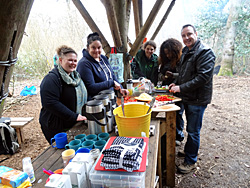Summary
Summary

The Westonbirt project aims to:
- Enable visitors to increase their learning about, and appreciation of, the Westonbirt Arboretum tree collection and landscape heritage
- Conserve the Grade 1 registered historic landscape of Westonbirt Arboretum
- Increase the number and range of people who take part in Westonbirt Arboretum’s heritage
The project is funded by the Heritage Lottery Fund and started in 2011/12.
Research objectives
This evaluation focuses on two aspects of the Westonbirt project.
1) The Community Inclusion programme – with the aim of understanding:
- What types of activities did the Community inclusion programme facilitate, and what types of people took part?
- Did participation in these activities lead to wellbeing outcomes for participants?
- Did participation lead to any changes in behaviours or attitudes for participants?
2) The Visitor experience – with the aim of exploring:
- Visitor information provision and seeking
- Activities visitors undertake on site
- Visitor engagement and understanding of the Westonbirt core messages, and on-site interpretation
Results
The Community Inclusion programme reached out to a targeted, but diverse range of participants who do not normally access Westonbirt. Participants included young people with autism, low confidence and self-esteem, and adults with drug and alcohol addiction, and mental health problems. Participant observations and in situ interviews on site were the methods used to gather evidence. Participants got involved in a range of creative activities as well as woodland management.
Wellbeing outcomes identified by participants included:
- Physical and mental wellbeing – terms such as calm, atmosphere, stress free, tranquil, peaceful and therapeutic were used to describe their experiences
- Taking notice – of sights, sounds, smells, their own feelings and emotions
- Learning – about themselves, and nature
- Connecting to nature – feeling closer to the natural environment, and conserving nature
- Connecting to people – working together in an unthreatening way, supporting each other
- Sharing – experiences, food with others.
Visitor Experiences were explored through an on-site survey, on-line survey and focus groups. These methods aimed to capture the visitor experiences of the Arboretum and its role as a tree and botanical collection and its conservation activity. The research studied the new welcome and information offer at Westonbirt Arboretum. These were improved via the Heritage Lottery Funded project and included the creation of a new Welcome building and exhibits, an App, new trails and interpretation on site. The study emphasised the multiple benefits and rich experiences many visitors have at Westonbirt. Areas for improvement included those which support greater understanding of the arboretum’s key messages and those which are targeted to different types of visitors and provide with a greater awareness and understanding of what is on offer for visitors.
Reports
Westonbirt, the National Arboretum: Visitor Experience Evaluation Final Report, Liz O’Brien & Jack Forster 2018.
A calm, peaceful and beautiful place Evaluation of the Heritage Lottery Fund – Westonbirt Community Project, Liz O’Brien 2018.
Publications
Engaging with and Shaping Nature: A Nature-Based Intervention for Those with Mental Health and Behavioural Problems at the Westonbirt Arboretum in England Journal Article, Open Access, Liz O’Brien 2018
Status
The evaluation and research is now complete.
Contact
Funders and partners
The Heritage Lottery Fund and Forestry Commission England funded this evaluation
Forestry Commission policy
The Public Forest Estate in England managed by Forestry Commission England provides a safe for people to play and relax and allows opportunities for people to be inspired and get involved. A key aim is to extend access across the Estate, and expand opportunities for communities to become involved with the Estate and take part in activities that improve quality of life, health and learning.
